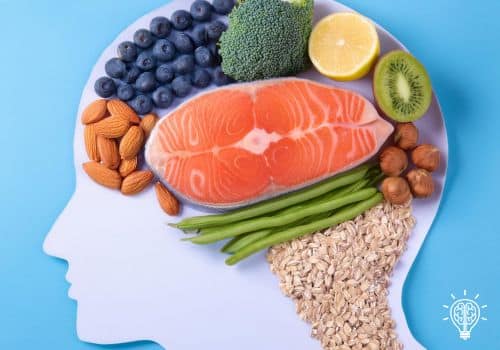How Nutrition and Executive Functioning Are Connected
Have you ever felt foggy-headed after a sugary breakfast or sluggish after skipping meals? The way we eat directly affects our brain’s ability to focus, plan, and regulate emotions—key aspects of executive functioning. Let’s dive into nutrition and executive functioning.
Executive functioning refers to the set of cognitive skills that help us manage time, stay organized, regulate emotions, and make decisions. These abilities are heavily influenced by the brain’s health, which is in turn affected by diet, hydration, and exercise.
By making intentional choices about what we eat and how we move, we can improve our mental clarity, reduce stress, and enhance cognitive performance.
The Brain’s Nutritional Needs
The brain is an energy-intensive organ, using about 20% of the body’s daily energy intake. To function optimally, it requires:
- 💡 Glucose: The brain’s primary fuel, best sourced from complex carbohydrates.
- 🧠 Healthy fats: Essential for brain cell communication and memory.
- 🦠 Vitamins and minerals: Support neurotransmitter production and brain function.
- 💧 Hydration: Even mild dehydration can impair focus and memory.
- 🏃 Physical activity: Improves blood flow to the brain, supporting cognitive function.
Best Foods for Executive Functioning
Certain foods have been shown to enhance cognitive function by supporting memory, focus, and emotional regulation. Here are some of the best options:
1. Omega-3 Fatty Acids for Focus and Memory
Omega-3s are essential fats that help build brain cell membranes and reduce inflammation. Studies show they support memory, focus, and emotional regulation.
Best sources:
- 🐟 Fatty fish (salmon, sardines, mackerel)
- 🥑 Avocados
- 🥜 Walnuts and flaxseeds
2. Complex Carbohydrates for Sustained Energy
The brain relies on glucose, but refined sugars cause energy crashes, leading to poor concentration. Choosing slow-digesting carbs provides steady energy and focus.
Best sources:
- 🍠 Sweet potatoes
- 🌾 Whole grains (quinoa, brown rice, oats)
- 🥦 Fiber-rich vegetables
3. Antioxidants for Cognitive Protection
Antioxidants help fight oxidative stress, which contributes to brain fog and cognitive decline.
Best sources:
- 🫐 Berries (blueberries, strawberries, blackberries)
- 🍫 Dark chocolate (70% cacao or higher)
- 🍵 Green tea
4. Protein for Neurotransmitter Production
Proteins supply amino acids needed to produce neurotransmitters like dopamine and serotonin, which impact motivation, mood, and attention.
Best sources:
- 🍗 Lean meats (chicken, turkey)
- 🥚 Eggs
- 🌱 Plant-based sources (beans, lentils, tofu)
The Role of Exercise in Executive Function
Beyond nutrition, exercise is one of the most powerful tools for improving executive functioning. Physical activity increases blood flow to the brain, reduces stress hormones, and boosts dopamine and serotonin levels.
Benefits of Exercise for Executive Functioning
- 🚀 Improves focus and concentration: Aerobic exercise enhances attention span and cognitive flexibility.
- 😌 Reduces stress and anxiety: Movement lowers cortisol levels, helping regulate emotions.
- 💭 Enhances memory and learning: Exercise promotes neurogenesis (the growth of new brain cells).
Best Types of Exercise for Brain Health
- 🏃 Aerobic exercise: Activities like running, cycling, or swimming boost overall brain function.
- 🧘 Mindful movement: Yoga and tai chi improve cognitive flexibility and emotional regulation.
- 🏋️ Strength training: Resistance exercises support long-term brain health.
How to Build a Brain-Boosting Lifestyle
Optimizing executive functioning isn’t just about eating well—it’s about building sustainable habits that nourish both the body and mind. Here’s how to integrate these strategies into daily life:
1. Plan Balanced Meals
Build meals that include protein, healthy fats, fiber, and complex carbs to maintain stable energy levels and support brain function.
2. Stay Hydrated
Even mild dehydration can impact memory and concentration. Aim for at least 8 glasses of water per day and limit sugary drinks.
3. Move Daily
Incorporate at least 30 minutes of movement into your day, whether it’s a walk, yoga session, or strength training.
4. Reduce Processed Foods
Limit processed and ultra-processed foods that contribute to brain fog, mood swings, and fatigue.
5. Prioritize Sleep
Poor sleep disrupts executive functioning, focus, and emotional regulation. Aim for 7-9 hours of sleep per night for optimal cognitive health.
The Paradox of Healthy Habits: A Cycle of Support and Struggle
Developing healthy habits like eating well, exercising, and maintaining a structured routine directly improves executive functioning—enhancing focus, self-regulation, and cognitive flexibility. However, the paradox is that strong executive function is often needed to build and maintain these habits in the first place.
For example:
- Good nutrition supports focus, impulse control, and decision-making—but maintaining a balanced diet requires planning, prioritization, and resisting unhealthy temptations.
- Exercise boosts motivation, stress regulation, and mental clarity—but sticking to a fitness routine requires time management, goal-setting, and consistency.
- Quality sleep enhances memory, focus, and emotional regulation—but getting to bed on time requires impulse control, evening routines, and limiting distractions.
This paradox explains why many people struggle to build and sustain healthy habits, even when they know they would feel better with the right lifestyle choices.
The good news? Executive function is a skill that can be strengthened—and with the right strategies, you can break out of this cycle.
How Executive Function Coaching Can Help
If you struggle with meal planning, maintaining a workout routine, or sticking to healthy habits, it’s not just a willpower issue—it’s an executive function challenge.
Executive function coaching provides:
- ✔️ Personalized strategies to develop structure and consistency
- ✔️ Accountability and motivation to sustain long-term habits
- ✔️ Tools to improve time management and planning for better decision-making
By strengthening executive function skills, you don’t just improve your productivity—you also create a foundation for lasting, healthy habits that fuel your brain and body.
📞 Want to break the cycle and build habits that last? Contact us for executive function coaching today!





